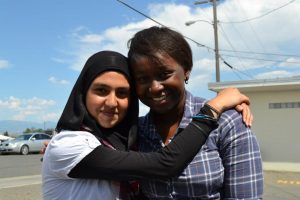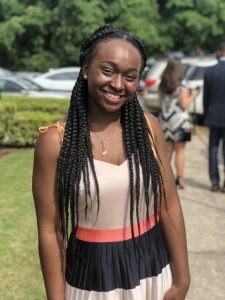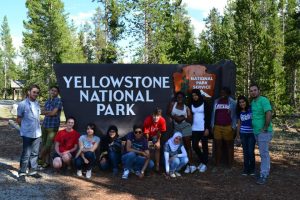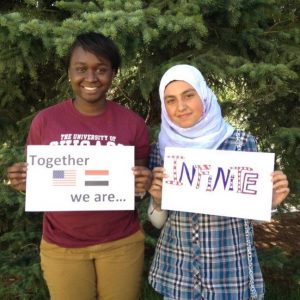-
What We Do
- WHERE WE WORK
-
About Us
 Welcome Message from Carol Jenkins
Welcome Message from Carol JenkinsFor more than 90 years, World Learning has equipped individuals and institutions to address the world’s most pressing problems. We believe that, working together with our partners, we can change this world for the better.
On my travels, I’ve had the opportunity to meet with many of those who have joined us in this mission. In Baghdad, we’ve trained more than 2,300 Iraqi youth who are already giving back at home. In London, our partners in the TAAP Initiative strongly believe that we are all responsible to practice inclusion. And in Vermont, our Experiment in International Living and School for International Training participants prove every day that they have the tools and the determination to change the world.
Please join us in our pursuit of a more peaceful and just world.
- Get Involved
Media Center > Story
How an Exchange Helped One U.S. Student See the World—and Her Own Country
November 14, 2018

Stephanie Greene believes international education can change the world.
“I think it’s really important to expand your worldview, to realize the world is so much bigger than my neighborhood, my city, my state, and my country,” she says.
Greene learned this lesson firsthand the summer before her senior year in high school when she traveled around the United States alongside young people from Iraq as a participant in the Iraqi Young Leaders Exchange Program (IYLEP).
For 10 years, IYLEP has brought Iraqi high school and undergraduate students to the U.S. for four-week exchanges focused on leadership, peacebuilding, and civic engagement. Select students from U.S. schools also join the program, which is sponsored by the U.S. Embassy Baghdad and the U.S. Department of State with funding provided by the U.S. government and administered by World Learning.
In 2012, Greene was one of the U.S. participants, traveling with IYLEP to Brattleboro, Vermont; Bozeman, Montana; and Washington, DC.
IYLEP seemed like a perfect fit for the Chicago native. She was interested in other cultures, having traveled with her family and studied Spanish from an early age. She also attended a diverse high school where she worked to bridge cultural divides, including serving as her high school’s diversity chair, a student government position tasked with planning events to bring their community together.

“I’d never met anyone from Iraq and I had never been to Montana or Vermont,” she says. “So, I was just really excited to meet new people who weren’t from Chicago and to learn a bit more about the world.”
IYLEP didn’t just teach Greene about the world; it changed the way she saw the world and her own place in it.
When Greene joined IYLEP, she didn’t know much about Iraq aside from the violence she had seen on the news. Through her new friendships with Iraqi high schoolers, she began to understand that their lives were far richer than that — and she also saw how their day-to-day lives were impacted by world events through things like government-imposed curfews. This, she says, was an important discovery.
“Now that I’m an adult, and as I grow in my career, it is important that I have a worldview because I could one day be making decisions that impact people in other countries,” she says.
The international exchange program also helped the teenagers dispel stereotypes as they learned about their differences. Greene notes that most of the students — both Iraqi and American — had never met or interacted with anyone from the other culture. One of the Iraqi students even told Greene that she thought all black Americans were gangsters because that’s how they were portrayed in movies.
“Here I am, a black person, and I’m not a gangster,” Greene says. “Now she has a different idea of what a black American could be or who they are. That’s cool.”
Greene applied this lesson later in life as she studied abroad in Spain and Mexico. As she was often the only black person in the small towns she visited, people would take pictures of her as she walked by them or ask about her braided hair. While she knew from experience that comments about her appearance can be rooted in racism, Greene realized these people were legitimately curious.
“One thing that I learned during IYLEP — and I’m grateful I learned this so young — is to take curiosity for what it is,” she says. “Assuming goodwill was a big thing I took out of IYLEP.”

Finally, a homestay in Montana also taught Greene how geography shapes people. She spent two weeks living with a host family in Bozeman, where she and her Iraqi roommate studied sustainability, took bike rides, and even went hiking for the first time together. The experience stood in marked contrast to the urban environments they grew up in.
“For both of us, it was an eye-opening experience in terms of how people live — even in my own country,” Greene says. “Where you live impacts how you live, the things you do, and the interests you have as well.”
International education has continued to play an important role in Greene’s life in the years since IYLEP. As a student at the University of Chicago, she studied abroad twice and volunteered with the Young African Leaders Initiative, an exchange program that brings African civic, business, and community leaders to the U.S. for training. She’s also still in touch with her friends from IYLEP.

Now a consultant, Greene hopes to find work in the international education field so that she can give other young people the same experiences she had through IYLEP.
“My experience in IYLEP really shaped everything I did afterwards, in terms of how I interacted with people and my curiosity for the world,” she says. “I think if everyone was able to have that experience, and go into it with an open mind, the world would be a better place as we begin to understand people.”
She recalls a team-building exercise from her IYLEP exchange. The U.S. and Iraqi students were paired up and asked to complete the sentence, “Together, we are … ” Greene and her friend Baraa chose the word “infinite.”
“‘Together we are infinite’ — that kind of sums up what I’ve learned from IYLEP,” she says. “When we all work together, we can literally do anything.”





